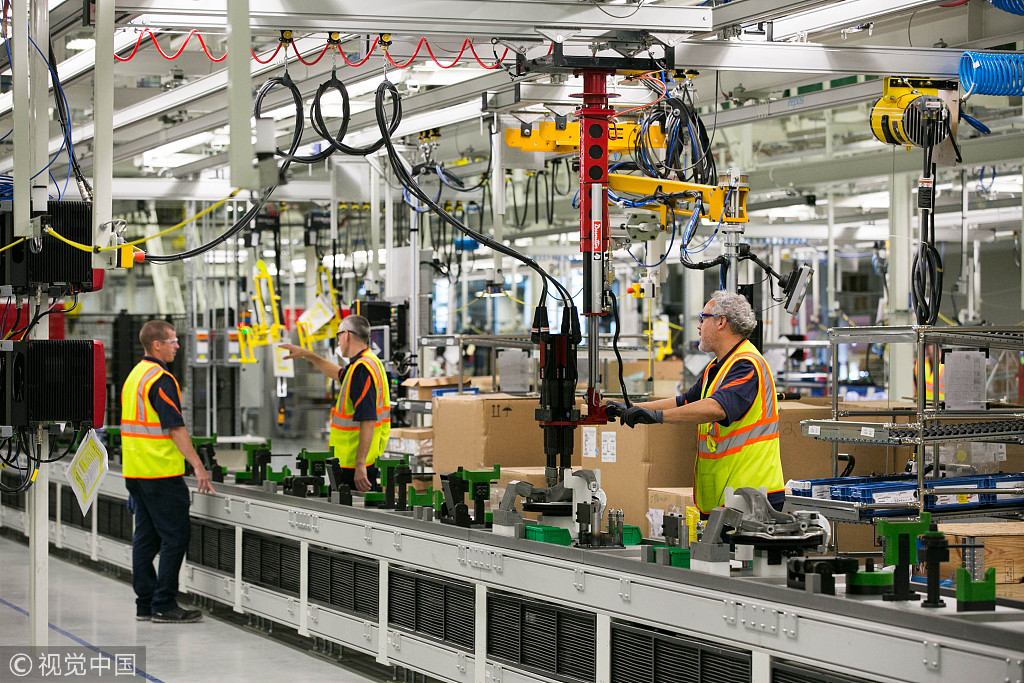Tariffs on China could cost thousands of US jobs


The tariffs already enacted by the Trump administration could cost the United States more than 45,000 full-time jobs, and if the US follows through with $200 billion in extra duties on Chinese products, another 255,000 jobs may be lost as a result, according to a recent report released by the US Tax Foundation project.
"Economists nearly unanimously agree that tariffs have negative economic effects, and this has been observed time and time again when countries impose tariffs," said Erica York, an analyst with the Center for Federal Tax Policy at the US Tax Foundation, who wrote the report titled The Impact of Enacting President Trump's Tariffs. The foundation is an independent tax policy nonprofit.
"One recent example is when the United States imposed tariffs on steel imports in 2002, more American workers lost their jobs due to higher steel prices than the total number of workers employed by the US steel industry itself," York said.
Missouri-based Mid-Continent Nail, the nation's largest nail producer, announced 60 layoffs on June 15 due to the steel and aluminum tariffs, which drove up raw material costs, and the company said all 500 of its employees could lose their jobs by September.
"If the additional tariffs that have been threatened by the Trump administration-which includes a $73 billion tax increase from tariffs on automobiles and a $40 billion tax increase from tariffs on a further $400 billion in Chinese products-were imposed, it would reduce US long-run GDP by about $82 billion, and this smaller economy would result in 255,283 fewer full-time jobs," York said.
She added that the tariffs could lead to a smaller economy and fewer jobs by increasing the prices that US companies pay for imports, which include things like parts and materials used to make finished products. Higher prices reduce the return to labor and capital, which would incentivize Americans to work and invest less, leading to lower output.
"If a business buys something from another business, it does so because such an exchange is profitable-it doesn't really matter whether that business is located across the street, in a different state or in a different country," York said. "And when an American business spends dollars on foreign goods, those dollars don't disappear; they will return to the US as a capital inflow at some time in the future."
Consumer confidence in the US also declined slightly in June after improving in May, according to another report by The Conference Board released on Wednesday.
"While expectations remain high by historical standards, the modest curtailment in optimism suggests that consumers do not foresee the economy gaining much momentum in the months ahead," said Lynn Franco, economic indicators director at The Conference Board, which analyzes what consumers buy and watch.
Two major auto trade groups warned the Trump administration on Wednesday that imposing up to 25 percent tariffs on imported vehicles would cost hundreds of thousands of auto jobs.
"Rather than creating jobs, these tariffs would result in the loss of hundreds of thousands of American jobs producing and selling cars, SUVs, trucks and auto parts," wrote a member of the Association of Global Automakers, which represents automakers such as Toyota, Volkswagen and BMW.
A study by the Peterson Institute for International Economics estimates the import tariffs could cost the US about 195,000 jobs and could go as high as 624,000 jobs if other countries retaliate.
York said: "These tariffs are taxes on Americans who consume products from China-meaning Americans will directly and immediately bear the burden of any tariffs. Broad tariffs are likely to provoke retaliation, increase prices for US businesses and consumers and reduce the competitiveness of US businesses.
"The administration should avoid following a path of imposing tariffs that could dampen the US economic outlook," she added.



































